U6 period 5 grammar
人教版高中英语选修六Unit5 Grammar课件

④Although he had failed several times, he didn't lose hope.
→ Having failed several times, he didn't lose hope.
1-1.用所给词的适当形式填空
① Hearing (hear) the news, they immediately set off for the
station.
② Having finished (finish) his homework, he helped his mother
with the housework.
⑤The child slipped and fell, so that he hit his head against the door.
→The child slipped and fell, (thus) hitting his head against the door.
常见的独立主格结构:
③ Having been surrounded (surround) for a month, the enemy
had to give in.
2-1.句型转换
①When she heard the terrible noise, she turned around immediately.
→Hearing the terrible noise, she turned around immediately.
(2)例句 1~6 中的现在分词短语在句中分别作 时间状语、原因 状语、
七年级英语U6知识点归纳总结

七年级英语U6知识点归纳总结Unit 6是七年级英语学习的一个重要环节,本文将从 Listening, Reading, Grammar 和 Vocabulary 四个方面介绍 U6 的主要知识点和技巧,帮助同学们更好地掌握这个单元的内容。
Listening在 U6 中,听力考试主要涉及对对话和短文的理解。
学生需要注意以下几点:听力技巧:1. 充分利用听力材料给出的提示,如图片、序号等。
2. 注意听说话人的性别、口音和语速,以便更好的理解对话内容。
3. 每段话题播放后,及时回答题目,不要让时间过去太久。
重点词语:1. 到达 (arrive)2. 乘坐 (take)3. 在...前面 (in front of)4. 在...后面 (behind)5. 花费 (spend)ReadingU6 阅读主要包括阅读短文和答题。
下面是一些阅读技巧和重点词汇:阅读技巧:1. 每段落结束后,小学生应该停下来思考,总结每个段落的主题。
2. 注意语境中的排比、比喻和重复,以更好的理解文章。
3. 了解阅读技巧中的基本题型:主旨题、推理题和细节题。
重点词汇:1. 而不是 (instead of)2. 连接 (link)3. 收集 (collect)4. 特别的 (special)5. 死亡 (death)GrammarU6 语法知识包括被动语态和名词性从句,这些知识点较为重要,同学们需要做好准备。
被动语态:1. 一般被动语态的构成:be + 过去分词。
2. 被动语态可以强调动作的承受者,而不强调动作的执行者。
名词性从句:1. 名词性从句主要用于作为名词的替代品,通常可以代替名词,如 what, where, when, why, how 等。
2. 名词性从句可以作为主语、宾语、表语或定语。
3. 名词性从句通常用于复杂句中。
VocabularyU6 的单词非常实用,例如乘坐、到达、在...前面、用完等。
下面是一些常用单词:1. 仍然 (still)2. 坐 (sit)3. 每个人 (everybody)4. 票 (ticket)5. 安静 (quiet)总结U6 是英语学习中的一个重要步骤,在听、说、读、写、词汇和语法各方面都有所涉及。
U6+Grammar+Tips+
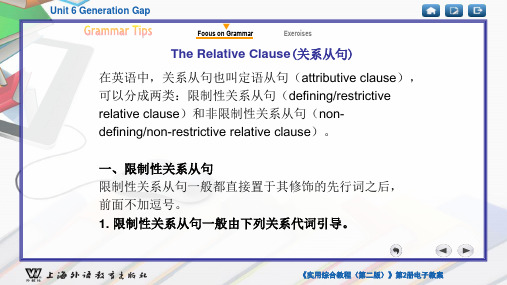
She was not on the train which/that arrived just now. 她不在刚才到的那列火车上。
This is the book (which/that) you wanted. 这就是你要的那本书。
《实用综合教程(第二版)》第2册电子教案
Unit 6 Generation Gap
《实用综合教程(第二版)》第2册电子教案
《实用综合教程(第二版)》第2册电子教案
Unit 6 Generation Gap
Focus on Grammar
Exercises
人 物 例如:
主语 who which
宾语 whom/who
which
所有格 whose whose/of which
Our guide, who was French-Canadian, was an excellent cook. 我们的向导是一个法裔加拿大人,他很擅长烹饪。
Unit 6 Generation Gap
Focus on Grammar
Exercises
The Relative Clause(关系从句)
在英语中,关系从句也叫定语从句(attributive clause), 可以分成两类:限制性关系从句(defining/restrictive relative clause)和非限制性关系从句(nondefining/non-restrictive relative clause)。
Unit 6 Generation Gap
Focus on Grammar
Exercises
I have just met a lady (whom/who/that) I saw last week. 我刚遇到一位我上个星期见过的女士。
Grammar,U6

7. that不能连接非限制性定语从句 不能连接非限制性定语从句 8. 当先行词指人也指物,关系代词只能用 当先行词指人也指物,关系代词只能用that 9. 当先行词前有最高级、序数词、very、only修饰时,指 、 修饰时, 当先行词前有最高级、序数词、 修饰时 物只能用that 物只能用 10. 当先行词是不定代词并指物只能用 当先行词是不定代词并指物只能用that 11. 当先行词是 当先行词是one of + n.(pl.)并在定语从句中作主语时, 并在定语从句中作主语时, 并在定语从句中作主语时 定语从句动词变化看名词复数。当先行词是the one of 定语从句动词变化看名词复数。当先行词是 + n.(pl.)并在定语从句中作主语时,定语从句动词变化 并在定语从句中作主语时, 并在定语从句中作主语时 看the one。 。 12. 当先行词是时间、地点、the way、the reason时,要看 当先行词是时间、地点、 、 时 它们在定语从句中作什么成分, 它们在定语从句中作什么成分,做状语可以用关系副 做主语或宾语只能用关系代词。 词,做主语或宾语只能用关系代词。 13. 关系代词 关系代词whose可以指人也可以指物,=of 可以指人也可以指物, 可以指人也可以指物 which/whom。如whose book= the book of which 或of 。 which the book
1. 2.
3. 4. 5. 6.
定语从句基本知识 定义:整个句子修饰名词或代词, 定义:整个句子修饰名词或代词,这样的句子叫定语 从句( 从句(attributive clause或relative clause)。 或 )。 定语从句的连词: 定语从句的连词:关系代词或关系副词 relative pronoun: that, which, who, whom, whose, as relative adverb: where, when, why (for which), that (in which) (关系副词 介词 关系代词 关系副词=介词 关系代词) 关系副词 介词+关系代词 定语从句所修饰的词叫先行词(antecedent) 定语从句所修饰的词叫先行词 分类:限制性定语从句(restrictive relative clause)或非 分类:限制性定语从句 或非 限制性定语从句(non-restrictive relative clause) 限制性定语从句 关系代词做宾语可以省略,关系代词前有介词不能用 关系代词做宾语可以省略, that。 。 as 在连接限制性定语从句时,先行词前必须有 在连接限制性定语从句时,先行词前必须有the same或such 修饰;as 在连接非限制性定语从句时,只 修饰; 在连接非限制性定语从句时, 或 能定整个句子,有“正如”之意。 (which 也可定整个 能定整个句子, 正如”之意。 句子=and it) 句子
外研版高考英语选修6Module2Fantasy第5课时GrammarWriting随堂练习
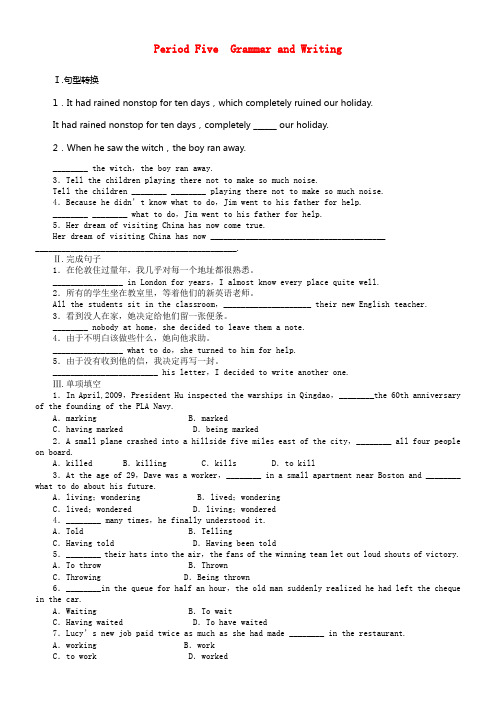
Period Five Grammar and WritingⅠ.句型转换1.It had rained nonstop for ten days,which completely ruined our holiday.It had rained nonstop for ten days,completely ______ our holiday.2.When he saw the witch,the boy ran away.________ the witch,the boy ran away.3.Tell the children playing there not to make so much noise.Tell the children ________ ________ playing there not to make so much noise.4.Because he didn’t know what to do,Jim went to his father for help.________ ________ what to do,Jim went to his father for help.5.Her dream of visiting China has now come true.Her dream of visiting China has now ______________________________________________________________________________________.Ⅱ.完成句子1.在伦敦住过量年,我几乎对每一个地址都很熟悉。
________________ in London for years,I almost know every place quite well.2.所有的学生坐在教室里,等着他们的新英语老师。
牛津译林版英语八年级下Unit6 Grammar课件(共22张PPT)

Amy: Why do you want to be a volunteer? Simon: Because any help would mean a lot. Many organizations provide help for people with intellectual disabilities, but it's (1) ___________________ impossible for them to do their work one-to-one without the help of volunteers. wonderful for you to be a volunteer. Do Amy: It’s (2) __________________ you need experience?
blood n.血
Answer questions about the reading part.
Is it fantastic to work as a volunteer? Yes. It is fantastic to work as a volunteer. Is it important to support the Special Olympics World Games? Yes. It is important to support the Special Olympics World Games.
It is + adjective + of... + to-infinitive
We can use It is + adjective + of... + to-infinitive to express what we think of someone's actions. It is adjective of kind It is brave of someone to-infinitive
高二英语选修六_Unit5_Grammar名师教学设计

Unit5 Grammar名师教学设计Book6 Unit5: The Power of Nature Section 3语法课框架单1/ 112/ 11Section 3语法课教学设计3/ 114/ 11DEL C3 深度加工知识Step 3Application(运用)1.Change the following sentences into the -ing form. Put the verbs intothe correct forms.(1)When Rose woke up in the middle of the night,she saw her roomwas as bright as day.(2)After we had stopped the car,we found ourselves trapped in thickfog and couldn't see clearly ahead.(3)Because I had spent all night reading the documents,I was verytired the next day.(4)As the child had never seen a rainbow before,he was very excited.Suggested answers:(1)Waking up in the middle of the night,Rose saw her room was asbright as day.(2)Having stopped the car,we found ourselves trapped in thick fog andcouldn't see clearly ahead.(3)Having spent all night reading the documents,I was very tired thenext day.(4)Having never seen a rainbow before,the child was very excited.2.Do Exercise 4 in Discovering useful structures on Page 37.First ask students to do the exercises individually and then let themdiscuss and check their answers with their partners,and finally give themthe correct answers and deal with any problems they might meet.1.在具体语境中运用ing形式作状语1.学生是否能在具体语境中掌握ing形式的用法5/ 11Exercises请用括号里所给动词的适当形式填空:1. _____ (live) in a southern city of China, I have never seen such a wonderful snow view.2. _____ (not grow) up yet, you’re not allowed to enter the bars.3. _____ (encourage) by the director, the actors performed wonderfully in the play.4. _____ (Know) all this, they made me pay for the damage.5. The students are sitting in the reading-room, _____ (read) all kinds of books. Key:1. Living2. Not having grown3. Encouraged4. Knowing5. reading二、单项选择1.The great hall was crowded with many people, _____ many children _____on their parents’ laps.A. including; seatedB. including; seatingC. included; satD. included; sitting2. _____ for a long time, most of the crops in this area died from lacking water.A. Being no rainB. There was no rainC. To be no rainD. There being no rain3.His letter, _____ to the wrong number, reached me late.4.A. having been addressed B. to have addressed5.C. to have been addressed D. being addressed4."You can't catch me" Janet shouted, ______away. (NMET2005全国卷3)A. runB. runningC. to runD. ran5.More and more people are signing up for Yoga classes nowadays, ______ advantage of the healthy and relaxation benefits. (NMET2005上海卷)6/ 11A. takingB. takenC. having takenD. having been taken6.______ in the queue for half an hour, Tom suddenly realized that he had left his wallet at home. (NMET2004北京卷)A. To waitB. Have waitedC. Having waitedD. To have waited答案1.A。
高中英语Module6PeriodFiveGrammar
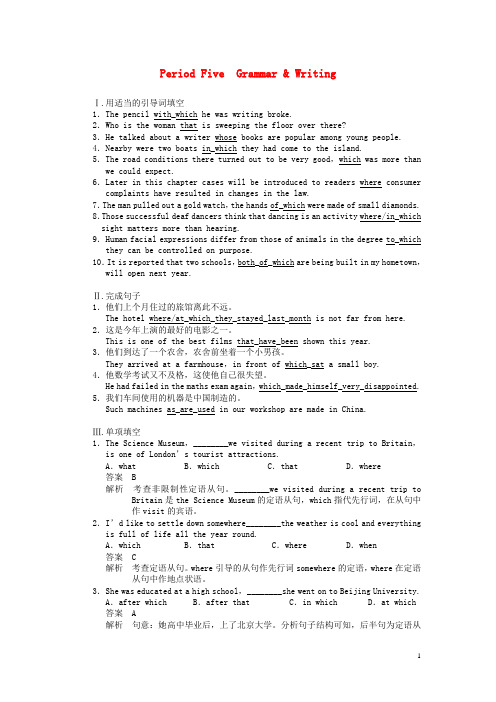
Period Five Grammar & WritingⅠ.用适当的引导词填空1.The pencil with_which he was writing broke.2.Who is the woman that is sweeping the floor over there?3.He talked about a writer whose books are popular among young people. 4.Nearby were two boats in_which they had come to the island.5.The road conditions there turned out to be very good,which was more than we could expect.6.Later in this chapter cases will be introduced to readers where consumer complaints have resulted in changes in the law.7.The man pulled out a gold watch,the hands of_which were made of small diamonds. 8.Those successful deaf dancers think that dancing is an activity where/in_which sight matters more than hearing.9.Human facial expressions differ from those of animals in the degree to_which they can be controlled on purpose.10.It is reported that two schools,both_of_which are being built in my hometown,will open next year.Ⅱ.完成句子1.他们上个月住过的旅馆离此不远。
英语选修6Unit5grammar
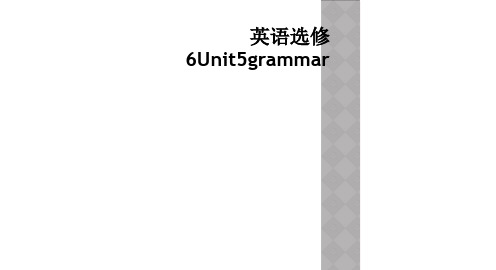
a swimming pool=a pool for swimming
a reading room=a room for reading
后置定语相当于省略的定语从句
• The girl who is sitting in the corner is adorable.
• We visited a temple which was built 200 years ago.
3) 被告诉过答案之后几次 4)N3o) t_/_N_e_v_e_r_h_a_v_i_n_g_s_e_e_n___(see) a rainbow
before as a child, he was very excited.
5) 以前从没看到过彩虹
• 独立主格结构 • 名/代+doing/to do/ done/名/形/副/介短
valuable time. 如果…(条件状语)
9.He dropped the glass, breaking it into
pieces. 结果状语
fo1l0lo.Twhiengsttuhdeeirnttseaccahmeer.into伴th随e l状ab语,
小结-ing 形式的用法
1)可以有名词作用,在句中做主语、宾语、 表语; 2)可以有形容词作用,在句中做定语、 表语或宾语补足语; 3) 可以有副词作用,在句中作状语。
• There _b_e_in_g__(be) no taxis, we had to walk.
• It _b_e_in_g____(be) Christmas, the government offices were closed.
• Her work _d_o_n_e___(do), she sat down for a cup of tea.
选修6 Unit5 Grammar
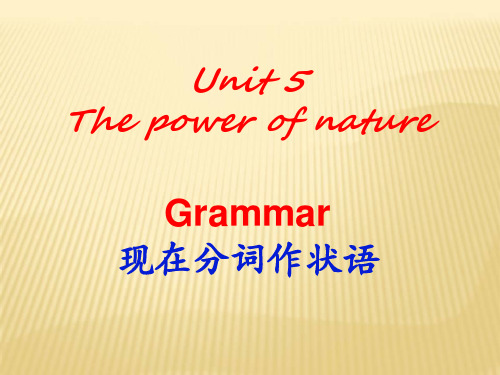
1.She is writing a letter to a friend of hers, B ____him to the party. A.Having invited B.inviting C.to invite D.invited 2.____all my letters,I had a drink and went out. B A.Finished B.Having finished C.Finishing D.To finish 3.___who she was,she said she was Mr.Johnson’s B friend. A. Asking B. Asked C. To be asked D. When asking
point to指向、表明
be used to 习惯于
see to 注意、处理
devote oneself to 献身于
be familiar to 为…熟悉
一些固定的-ing分词短语 generally speaking(一般来说), judging from…(根据…来判断), considering…(考虑到…), talking of…(谈到/提到…) Judging from his accent, he must come from Canada. Considering how poor he was, we decided to let him attend the concert for free.
二、现在分词的各种形式
语态 时态 一般式
主动语态 (not) doing
被动语态 (not) being done
完成式
(not) (not) having done having been done
- 1、下载文档前请自行甄别文档内容的完整性,平台不提供额外的编辑、内容补充、找答案等附加服务。
- 2、"仅部分预览"的文档,不可在线预览部分如存在完整性等问题,可反馈申请退款(可完整预览的文档不适用该条件!)。
- 3、如文档侵犯您的权益,请联系客服反馈,我们会尽快为您处理(人工客服工作时间:9:00-18:30)。
• 例2 Miss Green didn’t tell us _____ i n 2002, but now she lives in our sch ool .
A. where does she live B. where she lives C. where did she live D. where she lived
A. what does he say ys C. what he said say B. what he sa D. what did he
• ② 如果宾语从句说的是客观真理、自然现象 等,无论主句的时态是什么,从句都要用一般 现在时。 eg. Tom told me New York is the largest city i n America. • 例1Our teacher told us that the moon ____ r ound the earth. A. went B. turned C. go D. turns
A. where did Carol live B. where does Carol liv e
C. where Carol lives
D. where Carol lived
• 例3--- Could you tell me ____ at the me eting? --- Sorry , I don’t know . I didn’t go to th e meeting that day .
当….的时候 A. he comes , will come C. he comes , comes B. will he come , will come D. will he come , comes
• 考点四:其他常见考点:
• ① “Could you tell me...?”是用来征询对 方意见,并不表示过去,所以此时宾语从 句的时态可根据具体语境而定。
考点三:考查时态
主句
一般现在 时 一般过去 时
从
句
该用什么时态就用什么时态
用过去的时态
一般去时 was / were 或 V+ed(过去式) 过去进行时 was / were + V+ing 过去将来 would + V原 过去完成时 had + P.P. ( 过去分词)
• 例1--- Hi, Susan. It's said that a famo us singer will come to our city. Do you know ____? -- Next month. A. when does he come B. when he comes C. when will he come D. when he will come
近5年中考考题
• (2008中考) • 3.Which of the following is true ? • A. Could you tell me what is the matter with
him ?
• B. Do you know where does Elizabeth live ? deal
A. how can I improve my English B. how I can improve my English C. how could I improve my English
• 例2 Could you please tell me ______ ? I’ve lo st her address.
• 例2 ---I wonder ____ you’ll water this kind of tree. --- Once a week. A. how often B. how long
C. how soon
D. how much
• 例3 --- Can you tell me _____ the woman carrying a baby is? --- She is my sister.
一般现在时
条件/时 如果,假 当……的时候 如 间 状语从 句 什么时候 宾语从 是否 句
一般将来时
• 例4--- Could you tell me if 是否 ____ tomorrow ? --- Sorry , I’ve no idea. A. will he come B. would he come C. he will come D. he would come • 例5 ---When ____ again ? 什么时候 --- When he ____ , I’ll let you know.
Unit 6
考点一:考查连接词
陈述句变宾语从句 :that if / whether (…or not ) 一般疑问句变宾语从句: 用原来的特殊疑问词 特殊疑问句变宾语从句:
( what , who , where , which , how, how many …. )
• 例1 --- Excuse me. Could you tell me ___ I can get to the Space Mus eum? --- Of course. You can take bus No.1. A. where B. how C. if D. why
A. who B. what C. where D. which
• 例4 He asked me ___ I could sing the so ng“ My Heart Will Go on” . A. if B. weather C. what D. that
天气
• 例5 ---Do you know ____ the girl in red i s? --- I’m not sure . Maybe a teacher.
• C. I’ve got no idea how to do with it . reading • D. There are many people read in the libr9中考)
• 4.---Could you tell me _____ ? He is w anted by the head teacher . • ---Sorry , I’ve no idea. But he ______ h ere just now . A. where Tim was , was B. where is Tim , was C. where Tim is , was D. where Tim is , is
A. when B. how C. where D. what
考点二:考查语序
---陈述句语序
• 例1 • I hear Tom lives here , but I’m not sure ________ A.which room he lives in B. which room does he live in C. he lives in which room D. in which room does he live
• ★★注意 疑问词在宾语从句中作主 语语序不变 • She asked who wanted to be on TV • She asked me what was the matter with me ? ( what was the trouble with me / what was wrong with me ) • She asks me which is the way to th
• 例2 I want to know _____. A.when we should arrive at the airport B. when should we arrive at the airport C. when the airport we should arrive at D. when the airport should we arrive at
• 例5 • Mary is a girl full of questions . She alway s asks her mother ___________. A. where does she come from B. that the earthquake takes place rises man in the world C. who is the greatest
近5年中考考题
• (2007中考) • 2.---Could you tell me if ____ tomorrow ? --- Sorry , I’ve no idea. • A. will he come • C. he will come B. would he come D. he would come
eg. Could you please tell me where the p ost office is ?
• 例1---You speak good English . Could you tell me ____ ? --- You’d better communicate with ot hers in English as much as possible.
• 例2--- The teacher said that light _____ mu ch faster than sound. Is that right? --- Yes,it’s right. A. traveled B. had traveled
近5年中考考题
• (2006中考) • 1.---Do you know ____________ ? ---Yes, I do . She came here on foot . A. where Kate came from B. how Kate came here C. when Kate came here D. why Kate didn’t come here
